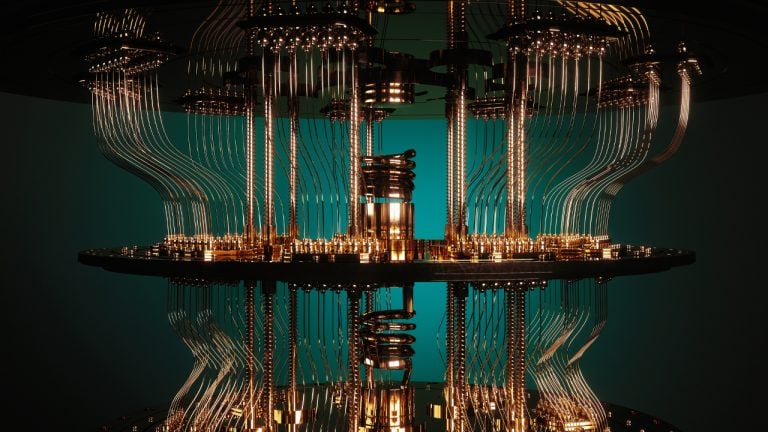
Scientists built a DNA computer capable of playing chess.
In the not-so-far future it may be possible to run entire computer networks inside of living cells thanks to a recent breakthrough in molecular computing from scientists in the US.
According to research published on Aug 22., a team of scientists at North Carolina State University and Johns Hopkins University have built a functional DNA computer.
As Cointelegraph previously reported, DNA storage has been around for a while. But this may be the world’s first functional molecular computer capable of conducting both storage and compute functions via DNA — instead of using electricity, like regular desktop computers and smartphones.

The chips will be used to set up an AI resource as a recent report said 20% of firms can’t get enough computing power for AI.
British Prime Minister Rishi Sunak is set to spend $130 million (100 million pounds) to buy thousands of computer chips to power artificial intelligence, amid a global shortage and race for computing power.
The Telegraph reported on Aug. 20 that the United Kingdom aims to build an "AI Research Resource" by mid-2024 as part of Sunak’s plan to make the country an AI tech hub.
The government is reportedly sourcing chips from makers NVIDIA, Intel and AMD — and it is understood that the science funding body UK Research and Innovation — which is leading the effort — is in the late stages of ordering 5,000 NVIDIA graphic processing units (GPUs).
However, while $130 million has been allocated to the project, the funds are reportedly seen as insufficient to match Sunak’s AI hub ambition, meaning government officials could pressure for more funding in an upcoming November AI safety summit.
It follows a recent report that said many companies are struggling to deploy AI due to available resources and technical obstacles.
In March, an independent review of the country’s AI computing capabilities said investment in the space is “seriously lagging” behind international counterparts in the United States and European Union.
At the time, less than 1,000 NVIDIA chips were available for researchers to train AI models — a panel recommended the U.K. make available at least 3,000 top-quality chips to meet immediate needs.
Related: US and China AI-tech standoff shows signs of spreading to other countries
On Aug. 16, S&P Global’s global AI trend report found that many firms reported they’re not ready to support AI, due to not having enough computing power, along with challenges managing data and security concerns.
We teamed with S&P Global to launch a global survey of #AI practitioners & decision-makers to see what’s driving or hindering their AI projects.
— WEKA (@WekaIO) August 16, 2023
Today, we published the survey’s findings in this new 2023 Global Trends In AI report. Get the skinny here https://t.co/k9W5AQ9hwg
While it's still early days for AI — S&P senior research analyst Nick Patience said a deciding factor for who will lead in the space will be decided by who can support AI workloads.
AI Eye: Apple developing pocket AI, deep fake music deal, hypnotizing GPT-4

ZK-proofs could help online privacy by only revealing relevant user information, solving the internet’s “biggest problem,” says Brennen Schlueter.
Zero-knowledge proofs could be used to solve the “biggest problem” plaguing the internet today: privacy, according to one cryptocurrency executive.
Speaking with Cointelegraph at the Ethereum Community Conference (EthCC) the marketing chief at privacy-focused infrastructure platform Aleo, Brennen Schlueter, said while ZK proofs have become a popular solution to provide blockchains with improved scalability through ZK-rollups, they have the potential to reshape the entire internet.
ZK proofs enable the transfer of information to take place between two parties in which the originator only needs to reveal relevant information to the receiver. For example, to prove an individual is of age to enter a bar without revealing their actual age or identity to a security guard.
Schlueter said the modern internet was not built to prioritize the privacy of its users.
“When data needs to change hands, when data needs to be custodied, we’re always going to have vulnerabilities there,” Schlueter explained in the context of how easily a user’s privacy can be breached online.
Great vibes all around at #InfraCon @EthCC yesterday!
— Marlin Intern (@marlin_intern) July 19, 2023
From insightful panels on ZK proofs to discussions on growing communities, I was all ears
Panel sessions often give away free battle-tested advice, which is incredibly informative & often underrated. pic.twitter.com/dau6yy7XEd
ZK proofs solve this privacy issue for not only Web3 but the entire internet, according to Schlueter.
Related: Healthy competition welcome — Polygon zkEVM lead
“With zero-knowledge proofs, we can actually start to see how data can be secured from the start by revealing the information that's required to know,” he added.
“I think it changes the route that we are going with the internet broadly.”
ZK-proofs could make the lives of developers and data custodians much easier, as they’ll no longer have to choose between creating a private environment or optimizing user experience, Schlueter explained, adding:
“Those two things are at war with the way that we currently structure the internet.”
Tiancheng Xie, the chief technology officer of ZK-powered interoperability platform Polyhedra, told Cointelegraph that artificial intelligence tools may also benefit from privacy and censorship-resistant properties offered by ZK proofs.
“Scalable and connected,” added Tiancheng Xie, CTO of @PolyhedraZK pic.twitter.com/UYSCtcQcS7
— Cointelegraph (@Cointelegraph) July 19, 2023
Schlueter said finance, identity and gaming are other sectors benefiting from ZK proofs
He claimed that more financial institutions are looking to ZK solutions in a bid to strengthen privacy where the firms see fit.
Magazine: ZK-rollups are ‘the endgame’ for scaling blockchains, Polygon Miden founder
Additional reporting by Zhiyuan Sun.

Sam Bankman-Fried is, for the most part, still able to freely access the internet through various devices. Prosecutors want to change that.
Sam Bankman-Fried, the former CEO of crypto exchange FTX, may no longer be able to play League of Legends and other video games if newly proposed changes to his bail conditions from United States prosecutors are approved.
In a Feb. 15 letter to United States District Judge Lewis Kaplan, U.S. Attorney Damian Williams asked the court to further expand restrictions surrounding Bankman-Fried’s electronic device usage.
They pointed to Bankman-Fried’s recent device usage as cause for concern, and agreed with the court’s intuition that it was “shortsighted” to focus only on restricting the use of apps, adding:
“There is now a record before the Court of a defendant who appears motivated to circumvent monitoring and find loopholes in existing bail conditions. The appropriate course, therefore, is broader restrictions on the defendant’s cellphone, tablet, computer, and internet usage, with limited exceptions.”
The prosecutors propose that Bankman-Fried should be prohibited from using cellphones, tablets, computers, or the internet, except for very limited uses such as reviewing pre-trial evidence, communicating with lawyers and accessing emails.
Here’s the list of proposed new bail restrictions that SBF is going completely ignore, without any real consequences https://t.co/cMVCdmRAj3
— Sean Tuffy (@SMTuffy) February 15, 2023
He would be restricted to using a single computer and cell phone, which in addition to his Gmail account would be monitored using a “pen register” — a device or process that essentially produces a list of phone numbers of internet addresses contacted from a specific source.
Bankman-Fried is understood to be an avid gamer, having reportedly played online video games such as League of Legends during fundraising rounds while at FTX.
Bankman-Fried also mentioned during an interview with New York Times on Nov. 13 that he likes to play games, as it helps him “unwind a bit” and clear his mind.
Under the newly proposed bail conditions, it appears that Bankman-Fried will no longer be allowed to partake in the activity.
Related: Judge allows release of identities of guarantors behind Sam Bankman-Fried’s bail
Earlier this month, the former CEO was prohibited from using encrypted messaging apps after he was found to have contacted potential witnesses in his criminal case.
He has also been temporarily banned from using VPNs on Feb. 14, after the Justice Department discovered he had used a VPN on two different occasions — in order to watch sports coverage. This ban will be further discussed during a Feb. 16 hearing.
Many from the crypto community were disgusted by the initial conditions of Bankman-Fried’s bail, which required him to wear an ankle bracelet but afforded him full computer and internet access from his parents luxurious home in sunny California.
SBF will be spending Christmas at home with his parents playing video games rather than locked up in a cell. What kind of justice is that?
— Layah Heilpern (@LayahHeilpern) December 23, 2022
 According to reports circulating on the web, 24 Chinese researchers have reportedly succeeded in breaking RSA encryption using a quantum computer. This would be a significant achievement, as RSA encryption is widely used in current security practices. However, a number of experts, computer scientists, and cryptographers do not believe the researchers have made a significant […]
According to reports circulating on the web, 24 Chinese researchers have reportedly succeeded in breaking RSA encryption using a quantum computer. This would be a significant achievement, as RSA encryption is widely used in current security practices. However, a number of experts, computer scientists, and cryptographers do not believe the researchers have made a significant […]
Engineers are eyeing a possible breakthrough in quantum computing. If all goes according to plan, computers that draw power from the quantum realm to perform their calculations may soon be small enough to embed into mobile phones and other everyday electronic devices. Usually the size of entire server rooms, quantum computers process some information up […]
The post Will Quantum Computing Technology Be Small Enough To Fit Into Smartphones? appeared first on The Daily Hodl.
 The British man who accidentally threw away a computer with 7,500 bitcoins on its hard drive has come up with a new plan to retrieve his lost coins from the city landfill. “We estimate there are between 300,000 – 400,000 tons of waste to look through,” he said. Man on Mission to Retrieve 7,500 Lost […]
The British man who accidentally threw away a computer with 7,500 bitcoins on its hard drive has come up with a new plan to retrieve his lost coins from the city landfill. “We estimate there are between 300,000 – 400,000 tons of waste to look through,” he said. Man on Mission to Retrieve 7,500 Lost […]